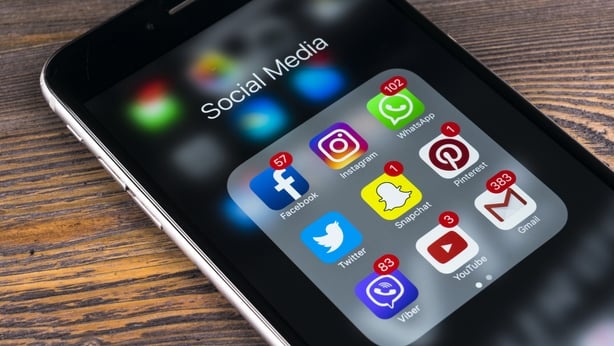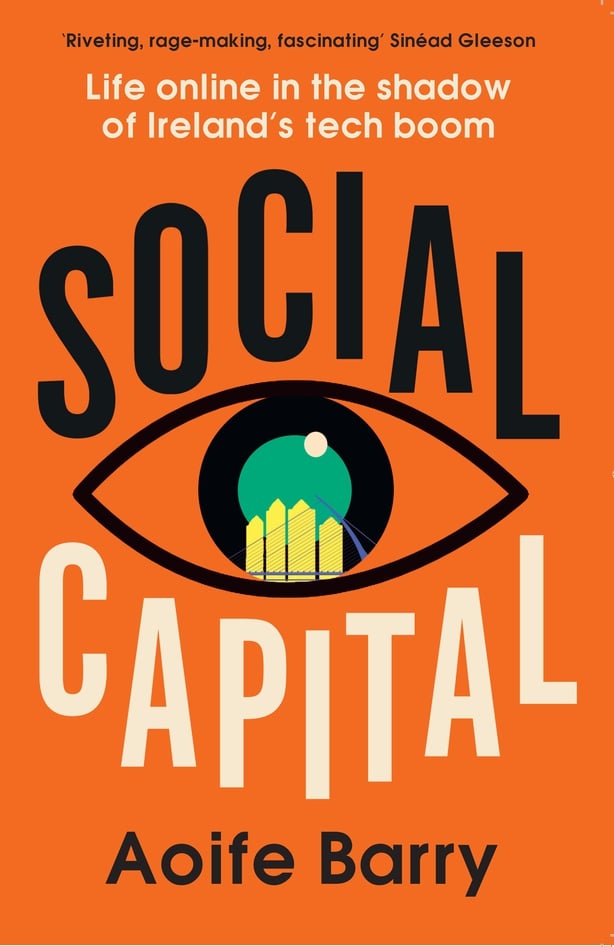We present an extract from Social Capital, the debut book from journalist and broadcaster Aoife Barry.
At the start of the millennium, the Tech Giants landed on Ireland's shores. Dublin, once one of Europe’s poorest cities, became a beacon of Silicon Valley’s promise of progress and power. As the face of the capital was remade in the image of Big Tech, Irish society embraced technology like no other. Romantic Ireland was dead and gone: social media was here to stay.
In this provocative account, Aoife Barry explores the human cost of Ireland’s Faustian pact with Big Tech, from the local communities uprooted by tech companies to the traumatised moderators squirrelled in the capital’s pockets, keeping the internet safe at a terrible price.
1991
You're eight years old and the telephone in your house is the most important communication device around. The information you get comes from the radio, TV, books, your parents, friends. You’re too young for newspapers and anyway, they’re just too big to read. You know that in the evening the TV newsreaders with serious faces and padded shoulders will tell you what’s happening in the world. Right after the Angelus rings out at 6 p.m., the important news will come.
Ireland has its first woman president. The big pop song that year is called Shiny Happy People, but the news is filled with sad stories, and words you like the sound of: Birmingham, Gorbachev, Dubrovnik, Maastricht.
You don’t know it, but a thing called the World Wide Web has recently been invented, meaning computers can now communicate with each other in a new way. The word 'web’ makes you think of spiders and the glistening threads they entwine: beautiful, but with a dark purpose woven through them.

2001
You’re 18 and about to do your Leaving Cert exams. You’re sure that every job you apply for as an adult will require telling an employer your results.
You know the internet exists. For a while, you could only use it at a friend’s house. You’d eat Pringles and then wipe the milky potato dust off your hands to type ‘chat rooms’ into Alta Vista. But recently your family got a computer and put it in the kitchen. Now you can go online in the morning, the evening, and after school. It has a noisy modem, but you don’t mind the sound because it feels like you’re entering a portal to somewhere new and exciting.
There is an incomprehensible amount of information online, but you just search for photos of the grunge band Silverchair, or visit chat rooms. You talk to faceless Australian men who email you afterwards. They write ‘LOL’ a lot and you wonder why they are telling you they love you.
You send your first email with an attachment and wonder how many hours it will take to arrive. Last year was the millennium. You had secretly wished the Y2K bug would strike all computers at the stroke of midnight, just to make things exciting. But nothing exciting happened.

2011
You’ve started working at a digital–only news publication which would not exist without the invention of high–speed broadband and WiFi. Your smartphone lets you go on the internet whenever you want. You no longer have to fight with your sisters and brother at home about
using the telephone and cutting out the internet. But all new things soon become routine, so this phase has stopped feeling exciting. It feels normal.
Your social life is recorded and catalogued through Facebook. It’s the latest in a string of websites that have become central to not just your social life but your way of thinking about yourself and the world. First there were MySpace and Bebo. Before them were the forums. Online, you can read people’s words and feel moved or appalled by them; you can share moments of connection; you can feel part of a fandom. You wonder, though, about the negativity that can seep in – the complicated characters you bump into online who make you feel on edge, or weird. It feels a small price to pay, though, for all of this novelty and possibility.
You used to write a music blog, but now you only blog occasionally because you’ve joined Twitter, which is a site made up entirely of status updates. It sounds laughable, but the whole world happens on there.
The country is in a recession and people have been emigrating to as near as London and as far away as Australia. Some of your friends work for the companies who run the biggest internet sites in the world. Everyone working for Google seems to live in apartments right by the office. The jobs there are like jobs from the future: free food, free gym, free beer, nap pods.
In a year’s time, you will start getting emails from someone with the initials BOD. You don’t know them, but they will follow you around the internet, emailing you comments, sending you photos they took from your social media accounts. You will think, is this just what it’s like to be online? Before the decade’s end, you’ll discover you’re not the only one who’s been getting emails from BOD.

2021
You wonder if this will be the year you finally get control over the time you spend online. Sometimes it feels like if you’re not on social media, you might as well not be alive. Your phone goes everywhere with you, like it does for everyone. People don’t joke about ‘smartphone addiction’ anymore.
The internet is for arguing with people about who offends who most over what. People who are seen as caring too much online used to be called ‘snowflakes’, as if they were so fragile, they could melt. Now sometimes people wonder if everyone cares too much, if there are just too many opinions jostling for space on social media. Reading the online discourse gives you a feeling of cynicism that sits like a jagged rock in your stomach.
Twitter is now one of the most influential and infuriating websites in the world. Facebook is a shrine to your youth and you avoid visiting it as much as you can. You’re living through a global pandemic. At the start of it, you received messages from strangers forwarded to you by friends, warning of lockdowns and telling you to stock up on food. You see lies and mistruths spreading across social media and WhatsApp, stories about ‘plandemics’ concocted by shadowy government figures and billionaires.
People cope with the pandemic by filming themselves dancing on a new app, TikTok. You open TikTok and flick through videos about losing weight, teenagers dancing, jacked–up young men talking about ways to cook oats and make sourdough. You’re told that the app gets to know you so well that eventually it will show you exactly what you want to see. You only use it intermittently so it doesn’t get to know you well enough to do that.
New legislation is brought in so people can be prosecuted for cyberbullying, or sharing nude photos without consent. Both of these things happen online all the time now.
BOD, the emailer, has been jailed for harassing you and five other women online. He is released after three years. His emails changed how you interact with the internet forever. You wonder: if everyone who’d been harassed online retreated, who would end up making the internet their home?
You watch as influencers influence, war breaks out, people fight, memes are made, tech billionaires toy with their power, and life goes on.

Social Capital is published by HarperCollins Ireland

